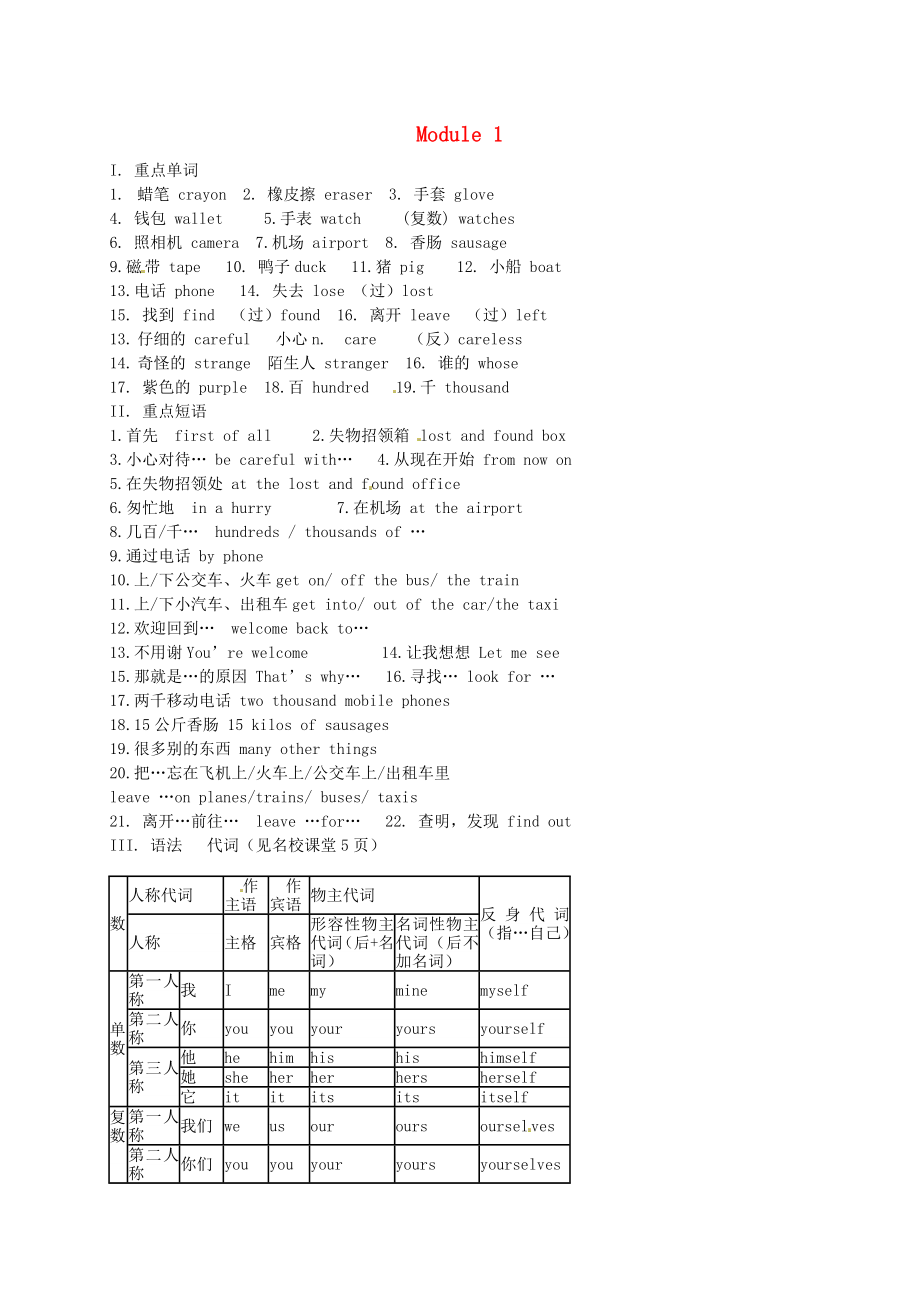《山東省陵縣鄭家寨鎮(zhèn)鄭寨中學(xué)七年級(jí)英語(yǔ)下冊(cè)Module1Lostandfound重點(diǎn)單詞練習(xí)無(wú)答案新版外研版》由會(huì)員分享��,可在線閱讀�,更多相關(guān)《山東省陵縣鄭家寨鎮(zhèn)鄭寨中學(xué)七年級(jí)英語(yǔ)下冊(cè)Module1Lostandfound重點(diǎn)單詞練習(xí)無(wú)答案新版外研版(3頁(yè)珍藏版)》請(qǐng)?jiān)谘b配圖網(wǎng)上搜索�。
1、Module 1
I. 重點(diǎn)單詞
1. 蠟筆 crayon 2. 橡皮擦 eraser 3. 手套 glove
4. 錢(qián)包 wallet 5.手表 watch (復(fù)數(shù)) watches
6. 照相機(jī) camera 7.機(jī)場(chǎng) airport 8. 香腸 sausage
9.磁帶 tape 10. 鴨子duck 11.豬 pig 12. 小船 boat
13.電話 phone 14. 失去 lose (過(guò))lost
15. 找到 find (過(guò))found 16. 離開(kāi) leave (過(guò))le
2����、ft
13. 仔細(xì)的 careful 小心n. care (反)careless
14. 奇怪的 strange 陌生人 stranger 16. 誰(shuí)的 whose
17. 紫色的 purple 18.百 hundred 19.千 thousand
II. 重點(diǎn)短語(yǔ)
1.首先 first of all 2.失物招領(lǐng)箱 lost and found box
3.小心對(duì)待… be careful with… 4.從現(xiàn)在開(kāi)始 from now on
5.在失物招領(lǐng)處 at the lost and found office
3、6.匆忙地 in a hurry 7.在機(jī)場(chǎng) at the airport
8.幾百/千… hundreds / thousands of …
9.通過(guò)電話 by phone
10.上/下公交車��、火車get on/ off the bus/ the train
11.上/下小汽車���、出租車get into/ out of the car/the taxi
12.歡迎回到… welcome back to…
13.不用謝You’re welcome 14.讓我想想 Let me see
15.那就是…的原因 That’s
4����、why… 16.尋找… look for …
17.兩千移動(dòng)電話 two thousand mobile phones
18.15公斤香腸 15 kilos of sausages
19.很多別的東西 many other things
20.把…忘在飛機(jī)上/火車上/公交車上/出租車?yán)?
leave …on planes/trains/ buses/ taxis
21. 離開(kāi)…前往… leave …for… 22. 查明��,發(fā)現(xiàn) find out
III. 語(yǔ)法 代詞(見(jiàn)名校課堂5頁(yè))
數(shù)
人稱代詞
?作主語(yǔ)
?作賓語(yǔ)
物主代詞
反身代詞(指…自己)
5���、人稱
主格
賓格
形容性物主代詞(后+名詞)
名詞性物主代詞(后不加名詞)
單
數(shù)
第一人稱
我
I
me
my
mine
myself
第二人稱
你
you
you
your
yours
yourself
第三人稱
他
he
him
his
his
himself
她
she
her
her
hers
herself
它
it
it
its
its
itself
復(fù)
數(shù)
第一人稱
我們
we
us
our
ours
ourselves
第二人稱
你們
you
you
6��、your
yours
yourselves
第三人稱
他們她們
它們
they
them
their
theirs
themselves
Ⅳ. 寫(xiě)作�����。
根據(jù)下面提示��,用英語(yǔ)寫(xiě)一篇“失物”啟事和“招領(lǐng)”啟示�����。
1. David丟失了一個(gè)藍(lán)色的杯子���。他的電話號(hào)碼是3924655�。
2.Cindy 撿到了一頂帽子�。她的電話號(hào)碼是4563929�。
范文: Lost Found
My blue cup, Is this your cap?
My name is Da
7、vid. Please call Cindy at 4563929.
Please call 3924655.
Ⅴ���、練習(xí)
一����、根據(jù)首字母提示填單詞����。
1. People use c________ to take photos.
2. These c_______ are mine. I use them to draw pictures.
3. We often lose things when we are in a h_____.
4. I don’t think students should take mobile p________ to school.
8、
5. Be c________ when you cross the road.
6. My pen is l________. Can you help me f________ it?
7. The boy often asks some s_________ questions and no one can answer them.
8. I left my w______ at home, so I don’t have any money on me now.
二���、用所給詞的適當(dāng)形式填空��。
1. At the moment, they __________(wait)
9���、for the bus.
2. This wallet isn’t ______ (I) .It’s ________(Daming).
3. There are _________(hundred) of books in my study.
4. There are two _________(hundred) watches at the lost and found office.
5. I need ten ______(kilo) of _________(sausage).
6. Here ______(be) some apples and oranges.
7.
10���、________(who) tapes are these?
8. Li Lei is a boy. ______ studies in a primary school. _____ brother lives with ______ and helps with ______ lessons.( he)
9. This isn’t ______knife. ______ is green. (she)
10. –What’s the name of the bird? --______ name is Polly. (it)
11. This pair of _______(g
11、love) _____(be) very beautiful.
12. It’s about twenty _______(minute) walk from my home to school.
13. There is a _______(strange) over there. No one knows him.
14. Lingling finished his homework all by _______(she).
三����、單項(xiàng)選擇。
1. There is ______ eraser on the desk. _____ eraser is white. A
12��、. a; The B. an; The C. the; The
2. Tony’s English book is ______. Now he is _______ it.
A. lose; looking for B. lost; look for C. lost; looking for
3. Please call Mary _____ 57685528.
A. at B. of C. for
4. Tom _____ his bag in the library. So he had to get it back. A. forgot
13�、 B. lost C. left
5. –Do you play ______ piano in your free time?
--No, I like sport. I often play _______ soccer with my friends. A. /; the B. the; / C. the ; the
6. – Would you like some noodles? -- _______. I am not hungry now.
A. Yes, please B. Here you are C. No, t
14、hanks
7. –What are you doing? --I’m ______my pen. But I can’t _____ it.
A. look for; find B. looking for; find
C. find; find D. finding; look for
四����、句型轉(zhuǎn)換。
1. These are Betty’s erasers. (對(duì)劃線部分提問(wèn))
______ ______ are these?
2. Mr. Wang is our Chinese teacher. (對(duì)劃線部分提問(wèn))
______ ___
15��、__ Chinese teacher?
3. People often lose things when they’re travelling. (對(duì)劃線部分提問(wèn)) _______ _______ people often lose things?
4.These are her gloves.(改同義句) These ______ are ______.
五��、根據(jù)漢語(yǔ)意思完成句子�����。
1. 這是貝蒂和玲玲的房間。 This is ______ ____ ________ room.
3. 他匆匆忙忙去上學(xué)時(shí)�����,總是把書(shū)落在家里����。
He always _______ his books at home when he goes to school _____ _____ ______.
4. 湯姆經(jīng)常晚起,那就是他經(jīng)常上班遲到的原因��。
Tom often gets up late. ______ ______ he is often late for work.
5. 從今以后請(qǐng)小心對(duì)待你的東西�����。
Please ____ ________ _____ your things _____ _____ ___.
6. 最后我查明是誰(shuí)打壞我杯子了���。At last I _____ _____ who _____ my cup.
 山東省陵縣鄭家寨鎮(zhèn)鄭寨中學(xué)七年級(jí)英語(yǔ)下冊(cè)Module1Lostandfound重點(diǎn)單詞練習(xí)無(wú)答案新版外研版
山東省陵縣鄭家寨鎮(zhèn)鄭寨中學(xué)七年級(jí)英語(yǔ)下冊(cè)Module1Lostandfound重點(diǎn)單詞練習(xí)無(wú)答案新版外研版

